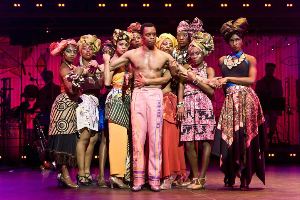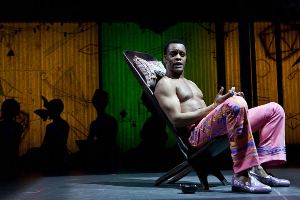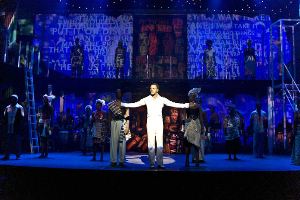
Color bursts accentuate images connoting passion, fame and fury as audience members are invited to an intimate performance by Fela Kuti, the Nigerian musician credited with the creation of funk, in the Broadway production of FELA!
FELA!, which has just opened on Broadway, applies stirring Afrobeat (a musical blend of jazz, funk, highlife and Yoruba rhythms) and inspired dancing akin to the period and region in West Africa, to tell the story of the controversial Nigerian musician who rose to fame in the '70s and '80s for his artistic innovations joined with political activism.
Fela Kuti, who died over 10 years ago, would have been flushed with delight to see the captivating power of "Zombie" and "Water No Get Enemy," sung in his Pidgin English, on audiences at the Eugene O'Neil Theater.
Kevin Mambo, who plays Fela, delivers the passionate lyrics of songs like these in all their revolutionary angst, not forgetting the vulnerability of our protagonist - who is hunted constantly by para-military groups who eventually raid his Africa Shrine club and throw his mother Funmilayo Kuti, a fe minist activist, over the second floor balcony.
minist activist, over the second floor balcony.
While we desire to glean more biographical details about this pioneering artist, we are not satiated, but more so taken down a journey of Fela's tumultuous life, pieced together by the piquant musical narrative and masterful choreography by Bill T. Jones.
Mambo, who nails the seditious, philandering, quick-mouthed Fela, prompts us to chat back at him, sing with him and even dance with him at times during the production.
As the play lends itself to discussing the absolu te corruption present in Nigeria, we are moved when Fela's dancers cleverly depict a vicious cycle set to Fela's musical storytelling: the man beating his wife because she didn't cook that day, that same man robbing a local businessman, and those businessmen accepting bribes to put an unqualified man into presidential office. It's all interconnected, we learn!
te corruption present in Nigeria, we are moved when Fela's dancers cleverly depict a vicious cycle set to Fela's musical storytelling: the man beating his wife because she didn't cook that day, that same man robbing a local businessman, and those businessmen accepting bribes to put an unqualified man into presidential office. It's all interconnected, we learn!
"As a person of color living in New York, I can relate to the themes of corruption of government and struggling to succeed," said Lisa Watkins, an educator who has also lived in Liberia, West Africa. "I'm hoping that by seeing this people are making the connections between the struggles of people in America and people all over the world."
In reality, Fela - himself - decided to run for presidential office to begin restoring power to the common man in Nigeria; yet, his name got removed from the ballot. But, it was this social engagement that catches the attention of Island Records founder Chris Blackwell, rock musician Ginger Baker and reggae pioneer Bob Marley.
In fact, the similarities found in Fela's music and that of a Bob Marley are striking.
 As much as they sent forth messages of human rights and political truths to the people, they both offered their public an opportunity to peer into their spiritual convictions, Bob Marley -- Rastafarianism and Fela Kuti -- his traditional African religion.
As much as they sent forth messages of human rights and political truths to the people, they both offered their public an opportunity to peer into their spiritual convictions, Bob Marley -- Rastafarianism and Fela Kuti -- his traditional African religion.
In the play, we witness Fela's soulful interaction with the god Shango and his fervent plea to speak to his ancestors. He never hid this from his audience, but made bare his spiritual discoveries.

